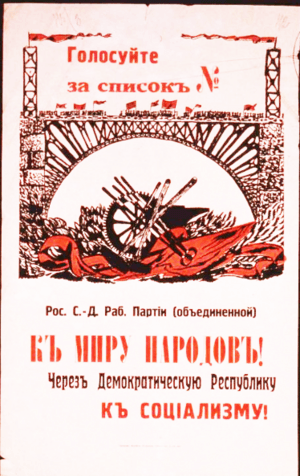Mensheviks facts for kids
The Mensheviks were a group of politicians in the Russian Empire who wanted to change their country into a socialist society. They were part of a bigger political party called the Russian Social Democratic Labour Party. The Mensheviks believed in a more gradual and democratic way to achieve socialism. This idea is known as social democracy.
Their main rivals were the Bolsheviks. The Bolsheviks were more extreme and wanted to create a Dictatorship to bring about Communism. The Mensheviks disagreed with this approach.
Contents
Who Were the Mensheviks?
The Mensheviks were a faction within the Russian Social Democratic Labour Party. This party was formed in 1898. The word "Menshevik" means "minority." This name came from a vote at a party meeting in 1903. Even though they were sometimes the majority, the name stuck.
They believed that Russia needed to become a modern, industrial country first. Only then could it be ready for a socialist revolution. They thought that a revolution should involve many people, not just a small group.
Menshevik Beliefs and Goals
The Mensheviks wanted to improve the lives of workers and farmers. They supported:
- Better working conditions.
- Fairer wages.
- More rights for ordinary people.
They believed in working with other political groups. They also thought that changes should happen through elections and laws. This was different from the Bolsheviks, who wanted a sudden, violent revolution.
Mensheviks and the Russian Revolution
The Mensheviks played a role in the Russian Revolution of 1917. After the Tsar (the emperor of Russia) was overthrown, they were part of the new government. This government was called the Provisional Government.
They tried to create a democratic system in Russia. However, they faced many challenges. The country was still fighting in World War I, and people were very unhappy.
Why They Lost Power
The Mensheviks eventually lost power to the Bolsheviks. This happened during the October Revolution in 1917. The Bolsheviks, led by Vladimir Lenin, took control of the government by force.
After the Bolsheviks took over, the Mensheviks were suppressed. Many of their leaders were arrested or forced to leave Russia. They continued to oppose the Bolsheviks from outside the country.
Key Menshevik Leaders
One important Menshevik leader was Julius Martov. He was a close friend of Lenin at first. But they disagreed on how the party should be run. Martov believed in a broader, more open party. Lenin wanted a small, disciplined group of revolutionaries.
Another notable figure was Noe Zhordania. He became the leader of an independent Georgia for a short time. This happened after the Russian Empire collapsed.
Menshevik Legacy
The Mensheviks' ideas about social democracy continued to influence political thought. Even though they lost the struggle for power in Russia, their vision of a democratic path to socialism lived on. Their story shows the different ideas people had about how to change society in the early 20th century.
Images for kids
-
Noe Zhordania, a Menshevik leader and Prime Minister of Georgia.
See also
 In Spanish: Menchevique para niños
In Spanish: Menchevique para niños
 | William Lucy |
 | Charles Hayes |
 | Cleveland Robinson |



